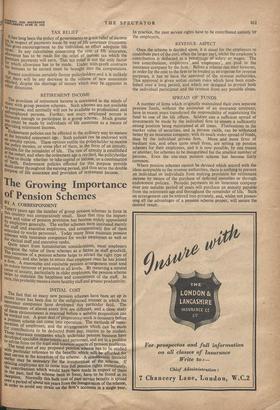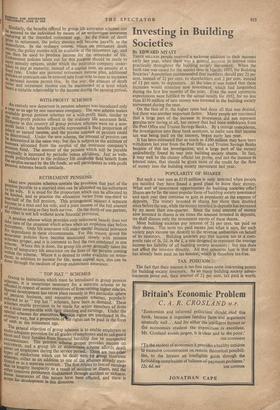The Growing Importance of Pension Schemes
By A CORRESPONDENT ThiRTY years ago the number of group pension schemes in force in this country was comparatively small. Since that time the import- ance and value of pension provision has become widely appreciated employers generally. The earlier schemes were instituted mainly for staff and executive employees, and comparatively few of them extended to works personnel. Today many firms maintain pension with insurance companies for works employees as well as for clerical staff and executive ranks. re Quite apart from humanitarian considerations, most employers ,,,Fognise the value of these schemes as a factor in staff goodwill. :Ile existence of a pension scheme helps to attract the right type of employee, an loyee, and also helps to retain that employee once he has joined gm. A reasonable and equitable pension arrangement must tend to rreduce turnover of personnel at all levels. By removing a natural _aetl.se of anxiety, particularly in older employees, the pension scheme !' Ms to maintain the happiness and contentment of the staff. In turn, this probably means a more healthy staff and greater productivity.
INITIAL COST The fact that so many new pension schemes have been set up in recent times has been due to the enlightened manner in which the insurance companies have developed ' this particular field. The circumstances of almost every firm are different, and a close study be these circumstances is essential before a suitable proposition can a worlced out. A great deal of preparatory work is necessary before Pension scheme can come into operation. The methods of remu- neration of employees, and the arrangements which can be made for contributions to be deducted from pay, require to be studied. Those insurance companies which undertake pension business have developed specialist departments and personnel, and are in a position to advise firms on the legal and taxation aspects of pension problems. ,The total cost of any proposed pension scheme has to be studied with particular reference to the benefits which will.be afforded for Mast service at the inception of the scheme. A considerable financial _,...clutlaY may be necessary for the inauguration of the scheme. If ting employees are to come into full pension rights immediately, !Ex contributions which would have been made in respect of them 1,11 the Past, had the scheme been in force, have to be found at its ineePtion. Normally this bulk cost of past service benefits is spread Over a period of about tenyears from the inauguration of the scheme, la order to avoid any strain on the firm's accounts in a single year. In practice, the past service rights have to be contributed entirely by the employers.
REVENUE ASPECT Once the scheme is decided upon, it is usual for the employers to contribute part of the cost, often the larger part, whilst the employee's contribution is deducted as a percentage of salary or wages. The two contributions, employers' and employees', are paid to the insurance company by the firm. Before a scheme can start however, in order for the cost to the firm to be treated as an expense for revenue purposes, it has to have the approval of the revenue authorities. This approval is given within certain rules which have been estab- lished over a long period, and which are designed to protect both the individual participant and the revenue from any possible abuse.
SPREAD OF FUNDS A number of firms which originally maintained their own separate pension funds, without the assistance of an insurance company, have in recent years transferred the responsibility of maintaining the fund to one of the life offices. Seldom can a sufficient spread' of investments be made by the individual firm to ensure a sufficiently strong position being maintained at all times. Fluctuations in the market value of securities, and in income yields, can be withstood better by an insurance company, with its much wider spread of funds, than by the individual private firm. More and more firms of medium size, and often quite small firms, are setting up pension schemes for their employees, and it is now possible, by one means or another, for schemes to be inaugurated for the smallest number of persons. Even the one-man pension scheme has become fairly common.
Where pension schemes cannot be devised which accord with the ideas acceptable to the revenue authorities, there is nothing to prevent an individual or individuals from making provision for retirement income by means of the purchase of deferred annuities or through endowment policies. Periodic payments to an insurance company over any suitable period of years will purchase an annuity payable from the retirement age and throughout the remainder of life. Such an arrangement can be entered into privately, and, whilst not posses- sing all the advantages of a pension scheme proper, will secure the desired result. THE S P E L Similarly, the benefits offered by group life assurance schemes can vie secured to the individual by means of an endowment assurance Maturing at the intended retirement age. In the event of death prior to retirement, the policy monies will become payable to the dependants. In the ordinary course, where no premature death occurs, the policy monies will be available at the retirement age, and Ean then be used to produce income for the remainder of life. n'-'ndowment policies taken out for this purpose should be made to '',4TrY annuity options, under which the insurance company under- (.41ses to pay at maturity, instead of a capital sum, an annuity at a osed rate. Under any personal retirement income plan, additional Policies or contracts can be entered into from time to time as increases e Personal income permit this. In this way, the amount of death 1,°ver and retirement income can be maintained at a level which 'ai's a suitable relationship to the income during the earning period.
WITH-PROFIT SCHEMES a An entirely new departure in pension schemes was introduced only 4, Year or so ago by one insurance company. The new scheme makes available group pension schemes on a with-profit basis, similar to tip withrofit policies offered in the ordinary life assurance field. rutherto in this country all group pension schemes were on a non- Profit basis : the benefits payable represented a fixed proportion of 'uarY or earned income, and the precise amount of pension could I!! determined. Under the new scheme, the amount of pension can t)'' determined in the same way, but this is subject to the addition of Pension allocated from the surplus of the insurance company's fund. The amount of the pension which will be payable eventually is increased by periodic bonus additions. Just as with- Profit Policyholders in the ordinary life assurance field benefit from ,„,.e surplus earned by the life funds, so will participants in with-profit Pension schemes benefit similarly.
RETIREMENT PENSIONS Most new pension schemes contain the provision that part of the 1:e1182-011 payable to a married man can be-allocated on his retirement ,0 livife. It is Usual for the proportion which can be allocated to be limited, and in practice the allocation varies from one-third to Pne-half of the full pension. This arrangement assures a separate 11:,Foineto a man and his wife, and a joint income of the full amount Pension so long as they both survive. On the death of one partner, me other is not left without some financial provision.
A Pension scheme which provides only retirement benefit does not take care of the situation which arises when an employee dies before retirement. Only life assurance will make special financial provision for dependants in these circumstances. For this reason, group life assurance policies have become associated closely with pension :tllies proper, and it is common to find the two combined in one erne. Where this is done, the group life cover generally takes the Aural of temporary life assurance on the lives of the persons coming ,/tithin the scheme. Where it is desired to make available on retire- ment, in addition to income for life, some capital sum, this can be done through the medium of group endowment assurance.
" TOP HAT " SCHEMES Owing to limitations which must be introduced in group pension schemes, it is sometimes necessary for a separate scheme to be effected in respect of senior executives of firms earning higher salaries. oPecial development has taken place recently in this particular sphere of pension ion business, and executive pension schemes, popularly serefh erred to as " top hat " schemes, have been in demand. These emes enable provision to be made for senior members of firms on a scale comparable with Ale' standing and earnings. Under the special schemes for executives, • rights are purchased in the °I.dinerY way, but a proportion o e rights can be paid in the form ilir oi cash at the retirement age. The general objective of group schemes is to enable employers to Take adequate provision for all grades of employees and to safeguard hem and their families from financial hardship due to unexpected circumstances. The pension scheme proper provides income on retirement, and a group life or endowment scheme affords death cover on employees during the service period. There are two other types of misfortune which can be dealt with by group insurance sFhernes, either as an addition to one of the schemes already men- tioned or as a separate contract. Thefirst relates to loss of earnings aue• to lengthy incapacity as a result of accident or illness, and the other concerns permanent disablement through accident or sickness. Some insurances of this nature have been effected, and there is scope for development in this direction.



















































 Previous page
Previous page